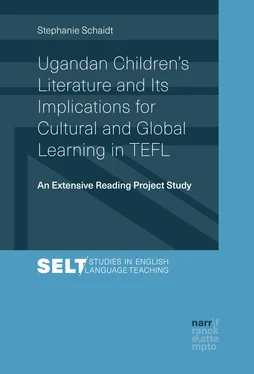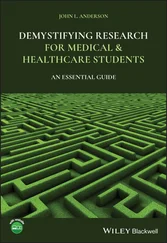The argumentation in this chapter has shown that in Uganda folktales adapted for children have distinctive features and many functions. They preserve oral stories from extinction and they continue to play an important role in the education of young people in the country. Folktales are, however, no static constructs passed on from generation to generation unaltered. While being retold, they are affected by a variety of influences and thus undergo change. As Jenkins (1993, p. 25) states, folktales adapted for children may, therefore, bridge “the gap between the past and the present, rural and urban, African and Western culture, an oral tradition and a written one”.
4.4.2 Fiction in a Realistic Mode
The adolescent years are characterised by many changes and challenges in Uganda as elsewhere. Questions of identity arise and young people develop their values and worldview. Many experiences young people in Uganda go through are universal. During puberty relationships with parents and elders change, peers gain in importance and young people have their first sexual experiences. Some of the young people are in school and study for their examinations and others struggle to find a job. Their life-style depends very much on their family background, level of education, gender, and also urban or rural residence.
The political and social situation in postcolonial Uganda, however, also forces young people to take up roles that are reserved for adults in other parts of the world: The AIDS epidemic left behind many orphans who have to care for themselves and also for their younger siblings; they become parents at a very young age (see Chapter 4.4.2.3). In addition, some children are abused as soldiers in the war in Northern Uganda (see Chapter 4.4.2.5).
Besides folktales, there are many Ugandan children’s narratives which reflect upon adolescence in post-independence Uganda. In the following, selected topics and titles of this fiction in a realistic mode are presented. The list of titles and topics analysed is selective and focuses on the narratives that were chosen for inclusion in the extensive reading project only. The first part of the analysis is concerned with narratives that deal with issues of growing up, i.e. young adult love and the search for an identity. The next subchapter then looks into school stories. Other narratives that are analysed in the following encompass topics such as HIV/AIDS, the girl child and child soldiers in the war in Northern Uganda.
4.4.2.1 Growing Up in Post-Independence Uganda
In much of the fiction written in a realistic mode, issues of growing up are addressed. The young people in the narratives, for example, fall in love for the first time or search for a place where they belong. As some of the titles of the narratives suggest (e.g. Voice of a Dream , Cherished Dreams ), most of the texts are concerned with young peoples’ dreams and aspirations. Some of the narratives deal with young people in cities, while others focus on life in rural areas.
The short stories and novels are set in post-independence Uganda. They reflect upon Ugandan society during a certain time after independence. The background setting of “First Kiss” (Baingana, 2005a) and Cherished Dreams (Adyeeri, 1994), for example, is the time after Idi Amin’s regime and his economic war.1 At first sight, “First Kiss”, a story published in the short story collection Tropical Fish. Tales from Entebbe (Baingana, 2005b), appears primarily to be concerned with the first romantic encounter of Christine. She is kissed by Nicholas at a party which she attends with her elder sisters. The next day at her former primary school, when she waits in vain for Nicholas for their anticipated first rendezvous, much of Christine’s reflections, however, focus on the terrible conditions the school buildings are in and the political situation in the country:
Things must have started falling apart years ago. She hadn’t noticed it then, probably because she was here every day. The change was gradual and the result normal, like many other things about Amin’s time, including the everyday fear in the air. She remembered how everyone had laughed in astonishment, then got used to it, when Amin by decree banned minis and wigs. (Ibid., p. 39)
Christine is disillusioned, both by the fact that her first date turns out differently than expected and by the hopeless post-war situation in Uganda. Also in Cherished Dreams (Adyeeri, 1994) the protagonist Sande, a young man, suffers under the economic conditions in the 1970s/80s in the country. The university he attends is in a very bad state:
Twenty years of political turmoil had steadily eroded the glamour of the University of East Africa. Only the crumbling facades, hidden by overgrown hedges, told of a once-reputable institution. Elsewhere there was unbelievable decay. Blocked manholes oozed grey stuff which flowed across the roads to fertilise wild bushes. The paint had long fallen off the walls and the sockets and cables had been vandalised, leaving naked wires hanging dangerously. The sinks, the showers, the door knobs and the glass louvres had also been looted. (Ibid., p. 102)
Sande suffers under poverty and the society he lives in is corrupt. Still, he fights for his dreams, manages to complete his education and becomes a teacher who is committed to work for a better future.
Other stories and novels are set in contemporary Uganda and use the HIV-epidemic, for example, as a backdrop. The life of Nanfuka in Voice of a Dream (Namukasa, 2006) is largely affected by AIDS. Her father dies from AIDS and her mother abandons the family. Consequently Nanfuka and her siblings become AIDS orphans (see HIV/AIDS narratives in Chapter 4.4.2.3). However, not the entire novel is concerned with the epidemic; love is also a central aspect of the narrative. Three of the thirteen chapters focus on Sendi, a young boy and former schoolmate of Nanfuka. He is known as a womaniser who sleeps around. The fact that he falls in love with Nanfuka and gradually changes his character over the run of the novel is an essential part of the plot. Therefore, Voice of a Dream may also be referred to as a romance novel.
Besides fighting for one’s dreams and young adult love, identity crisis and identity search are major topics in the narratives that deal with issues of growing up in post-independence Uganda. “The Hair Cut” (Lamwaka, 2010b), for example, is a story about Flora, a thirteen-year old girl who goes through a phase of self-doubt. She locks herself into her room and refuses to go to school because she feels ugly. Her mother struggles to get her out of this room and persuade her that her life is not that bad after all. Finally, when Flora gets her hair cut, she also regains her self-confidence and decides to go back to school the next day. Similarly, Mercy in Our Cousins from Abroad (Barungi, 2003) is plagued by feelings of insecurity and not belonging. Born and raised in Britain, she and her brother Adam are with their mother for the first time in Uganda to visit their cousins. Their parents have just divorced and the children are to attend boarding school in Uganda. Whereas her brother quickly makes friends with the children in the village, Mercy has problems in adapting to the new situation. She looks down at the living conditions and certain ‘superstitious’ beliefs of her cousins. When they in return start to avoid her, she feels left out and becomes homesick. Gradually, however, Mercy gets to know more about her new environment and finally used to the situation. At the end of the story, she and her brother are preparing to be taken to their new boarding school.
Although they focus on different issues of growing up, the narratives in this category have in common that they portray the young people as individuals with their own mind-sets, dreams and aspirations for their future. They go through phases of insecurity and look for a place where they belong. Though the situation in post-independence Uganda causes them many hardships (e.g. bad economic conditions, HIV-epidemic), they manage to set goals for themselves and go through character developments.
Читать дальше












